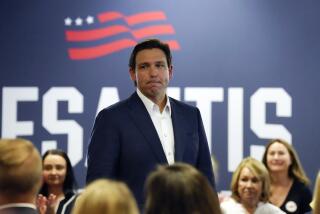Breaking free
- Share via
I’m an AP dropout. When classmates in my Advanced Placement U.S. history course take the AP exam Friday, I won’t be with them. When they pick up their pencils and start filling in those little bubbles, I’ll be reading the words of George Kennan, Lillian Hellman, Harry Truman and Paul Robeson -- for a paper I’m writing on the Cold War.
The problem with the AP program is that we don’t have time to really learn U.S. history because we’re preparing for the exam. We race through the textbook, cramming in the facts, a day on the Great Awakening, a week on the Civil War and Reconstruction, a week on World War II, a week on the era from FDR to JFK, a day on the civil rights movement -- with nothing on transcendentalism, or the Harlem Renaissance, or Albert Einstein. There is no time to write a paper. Bound by the exam, my history teacher wistfully says we have to be ready in early May.
Sometimes I feel as if the College Board, which administers the AP program, is haunting our history class -- a long, gray, flat board with a clock on it looming over us. Like an oracle, it tells us what is worth learning and how long learning should take.
The overriding goal is to crack the AP test. That means taking a lot of practice tests -- week after week, filling in those bubbles in class. It means researching past AP exams to predict what will be on the test. It means answering model AP essay questions for homework. It means brute memorization. My classmates ask: Will there be more questions on the American Revolution or World War I? What do we really have to know about mercantilism? Their unspoken question is: If I blow the AP test, can I still get into a good college?
In class, we cannot stray from the AP regimen. A few weeks ago, we were rushing through the 1960s with lightning speed. The Vietnam War is a fog. Somehow the New Frontier turned into the Great Society, which I always confuse with the New Freedom, the New Nationalism and the New Federalism. And what does CORE stand for?
But what really caught my eye was something in the textbook about a 1970 women’s liberation march down Fifth Avenue in New York, where some marchers burned their bras. Why was it radical to burn a bra, I wondered? But there was no time for this in class.
When the AP program originated in the early 1950s, the idea was to offer a rich curriculum of advanced work, bridging the senior year of high school with college. It was the brainchild of educators at colleges and prep schools, based on two studies funded by the Ford Foundation. The Educational Testing Service administered the first AP exams in 1954, with the College Board taking over in 1955. Today, the program promises a ticket to college admission and college credits through its 37 “college-level” AP courses and exams (in 22 subject areas), as diverse as physics and studio art, most taken by juniors.
But in applying to college, my classmates are learning that many schools grant no AP credits at all -- even for a perfect exam score of 5 -- and others only for some subjects. So, with nearly 1.4 million students worldwide taking 2.5 million AP exams in 2007 -- 300,000 in U.S. history -- the reality is becoming clear: AP classes have simply become another credential for college admission.
Instead of studying history, we study for the AP exam. And along the way, our education has come to resemble the production of Model Ts on Ford’s assembly line, with the College Board cracking down by auditing AP syllabuses before allowing schools to put the official AP trademark on student transcripts.
So I became an AP dropout; and I’m not alone. According to Education Week, since 2006, more than 2,000 high schools across the country and around the world have dropped the AP curriculum to march to their own drummers.
Meanwhile, freed from the AP regime as the exam approached, I slowed down to do independent research.
Sometimes I wonder how I would do on the AP exam -- but not for long. As an AP dropout, I hope to go to college on a road more meandering and slowly traveled.






